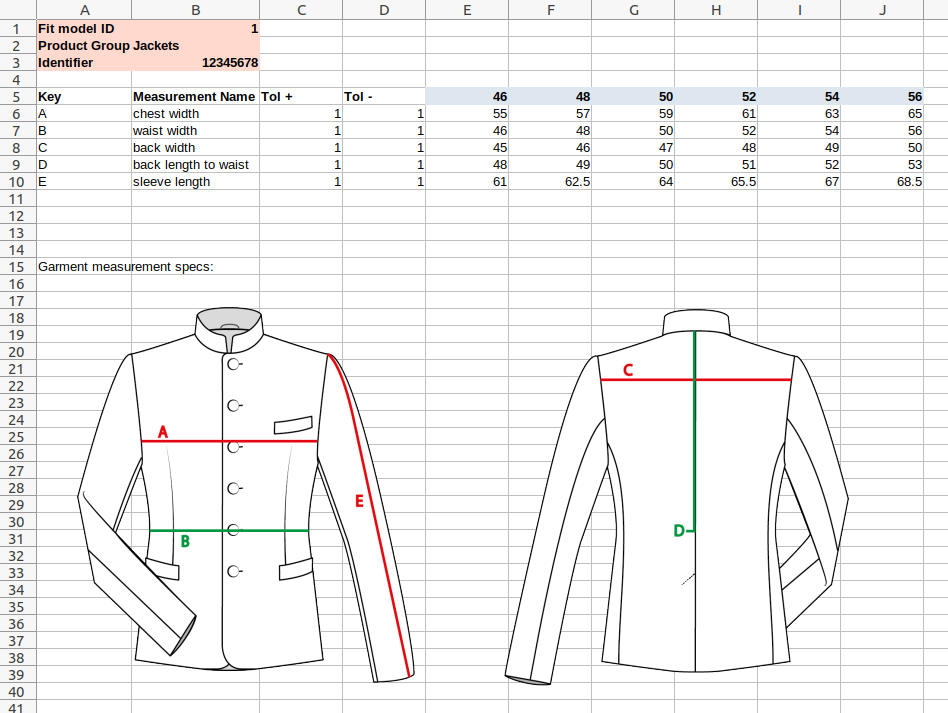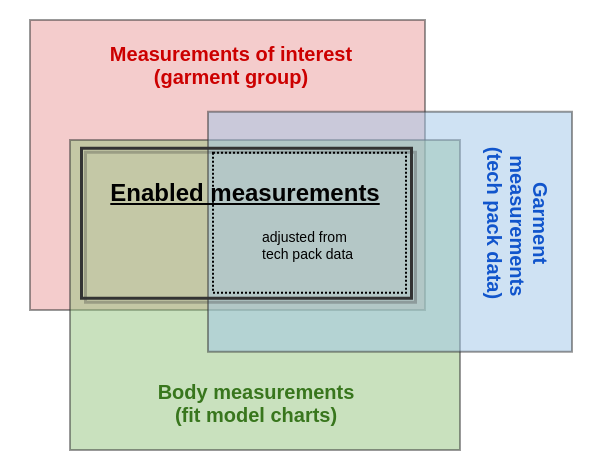Size Recommendation from Tech Packs
Overview
The way a garment of a given size suits a person varies among garments of different brands, a fact that consumers are very well aware of. First, some brands prefer, say, loose fit. Second, garments are often tailored to an in-house fit model specific to the brand (which may be a computer model, a mannequin, or an actual person); based on such specimens, measurements of the individual garment parts are then extrapolated in the grading process to obtain different sizes. The decision which size to choose for a given brand therefore depends on the body measurements of the fit model, as well as the measurements used for the production of the garment.
Provided with such data, PICTOFiT can assist the user in choosing the best size by providing an overall recommended size, and indicating whether the garment is loose or tight at certain body regions (both in a textual and visual way).
Requirements
To enable the size recommendation & visualization feature one or more fit model charts are required. A fit model chart defines the ideal model measurements per size. It is therefore essential for a size recommendation, as it indicates the fit intended by the manufacturer. Furthermore, each garment has to come with a tech pack that defines data specific to the garment at hand and a reference to the corresponding fit model chart.
Fit model chart
A fit model chart holds the measurements of models (incl. different sizes) that are used for designing the garments. The needed measurements and where to take them can be found here Measurement definitions . In other words, the fit model chart describes, for each size, the ideal measurements of a person wearing that size. Usually, fit models are shared among garments of the same type and brand.

Example of a fit model chart in a spreadsheet (not in the final input format)
Garment tech pack data
The tech pack data of a garment holds the measurements of the different sizes of the garments and where they have been taken, as well as some meta information (e.g. garment group). In particular, it indicates the different sizes in which this garment is available, and contains various measurements on the garment for each size. These measurements are usually required in the production process, but may also be used by the size recommendation algorithm.

Example of a tech pack in a spreadsheet (not in the final input format)
See Fit Model Chart and Tech Pack Specifications for more details.
Scope of results
The size recommendation for a garment operates on a set of sizes and a set of measurements that are extracted from the provided input data.
These extracted sets are called enabled sizes and enabled measurements respectively.
Enabled sizes
The set of enabled sizes is the intersection between the tech pack sizes and the fit model chart sizes.
The fit model chart sizes are defined as the union of all size values in the fit model chart data.
The tech pack sizes are defined as
the sizes of
availableSizesin the tech pack data if this field is not omittedotherwise the union of all
measurement_sizevalues in the tech pack data if at least one such field existsotherwise equal to the fit model chart sizes.
See Fit Model Chart and Tech Pack Specifications for further details.
Enabled measurements
The set of enabled measurements for a garment depends primarily on its assigned garment group and the measurements defined in the fit model charts.
Garment measurements from the tech pack (if available) are used to further adjust the existing ones.

See Garment groups and Measurement definitions for further details.
